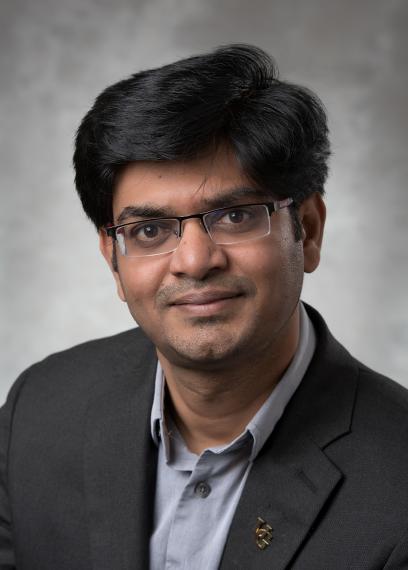Prasad Daggupati

Education and Employment Background
Dr. Prasad Daggupati received his PhD in Biological and Agricultural Engineering from Kansas State University in 2012. He then held positions as a postdoctoral research associate and an Assistant Research Scientist in the Spatial Science Laboratory at Texas A&M University. He joined the School of Engineering at the University of Guelph in 2016 where he is currently an Assistant Professor.
Research Themes
Daggupati investigates the complex interactions of anthropogenic drivers on water resources and ecosystems and water availability and quality using geospatial, hydrological modeling, artificial intelligence techniques, and field research. His research examines the climate-water-food nexus to develop holistic, well-planned, sustainable management strategies to provide solutions to the emerging water and food crisis. His goal is to provide sustainable solutions to solve complex field to watershed-scale management problems under changing climate and land use so that current and future generations will benefit. His broader research interests/activities include but not limited to:
- Anthropogenic influences on water resources. Daggupati seeks to understand the land-atmospheric interactions and anthropogenic influences on surface runoff, groundwater resources, and water quality. He is working to develop a decision support framework that includes coupling of agriculture, land surface, atmospheric, ecologic, and socioeconomic components to help inform good decisions.
- Hydrological modelling. Hydrological modelling could help solve emerging water quality and quantity issues. Daggupati seeks to improve existing hydrological model capabilities to better simulate hydro-geological processes.
- Unmanned Aerial Systems. Daggupati is applying Unmanned Aerial Systems (UAS) for environmental sustainability and precision agriculture.
- Artificial Intelligence. Daggupati investigates novel artificial intelligence frameworks for modeling various components of hydrology within a watershed system and predicts streamflows in ungagged catchments.
- Cloud computing and Optimization: Simulating and calibrating large-scale watershed models are time-consuming and labor oriented. Daggupati develops cloud computing frameworks for efficiently calibrating complex & large-scale watershed models and effectively optimizing watershed model-guided agricultural best management practices.
Highlights
- Division Editor for Soil and Water section of Canadian Biosystems Engineering Journal, 2019
- Associate Editor for Transactions of ASABE and Applied Engineering in Agriculture with Natural Resource Engineering section, 2019
- Standard Development Award, American Society of Agricultural and Biological Engineers, 2017
- Young Agricultural Engineer of the Year, Texas Section of the American Society of Agricultural and Biological Engineers, 2016
- Post-doc of the year, Soil and Water Assessment Tool Community, 2015
Media Coverage
Water Security
- Great Lakes Connection Newsletter: Blue and Green Resources: A Water Security Assessment of Ontario’s Grand River Watershed
Cloud computing and artificial intelligence
- Smart Computing for Innovation: Research Projects
- Greenland Group of Companies: CANWET